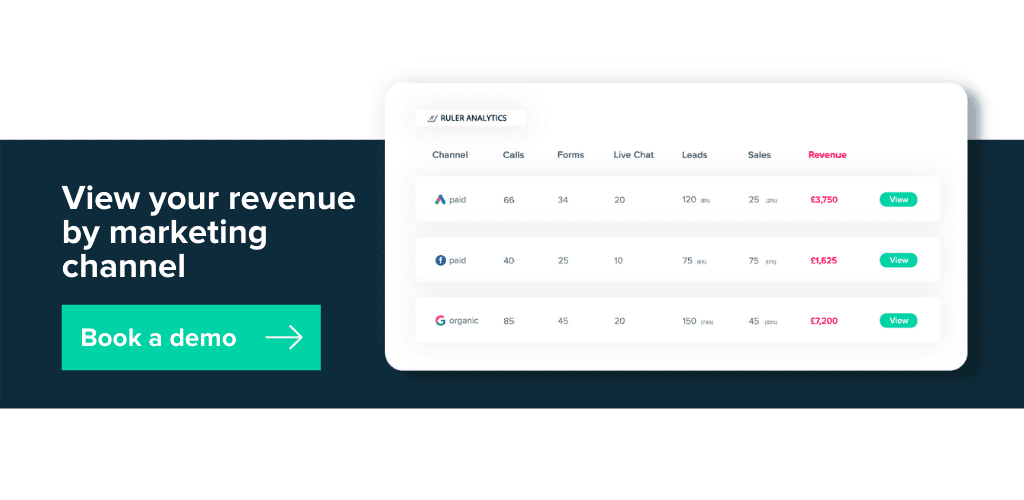PPC is a marketing option that all legal marketers should consider. But with customers converting via call, email or store visit plus long sales cycles and a very competitive market to think about, how can you outperform your competitors?
As a marketing professional at a law firm, your main KPIs will probably revolve around lead generation and total number of client cases.
We found that 37% of marketers struggle to generate high-quality leads for their sales teams.
And it’s no surprise given the data disconnect.
Paid is a consistently difficult channel to track. In fact, we found that 21% of marketers using PPC struggle to track it.
In this blog, we’ll go through:
Let’s get started.
PPC advertising is a great tool for legal marketing professionals to drive high-quality leads. When thinking about the buyer’s journey, PPC marketing can be used in each stage to push users down the funnel.
🚀 Pro Tip
Tracking your customer journey is essential to understanding how marketing impacts your bottom line. You can link all of the marketing touchpoints on a visitor level with the right tool.
Learn how to track your full customer journey.
However, PPC really shines from an awareness perspective. Whilst PPC is great to get you into position 1 on Google, there are a few things to consider.
First, local searches are likely to prioritise Google My Business results over SEO content.
For example, ‘solicitors firm London’, will highlight the map over web pages and blogs. But, PPC ads will always sit above the map result. Even on mobile.
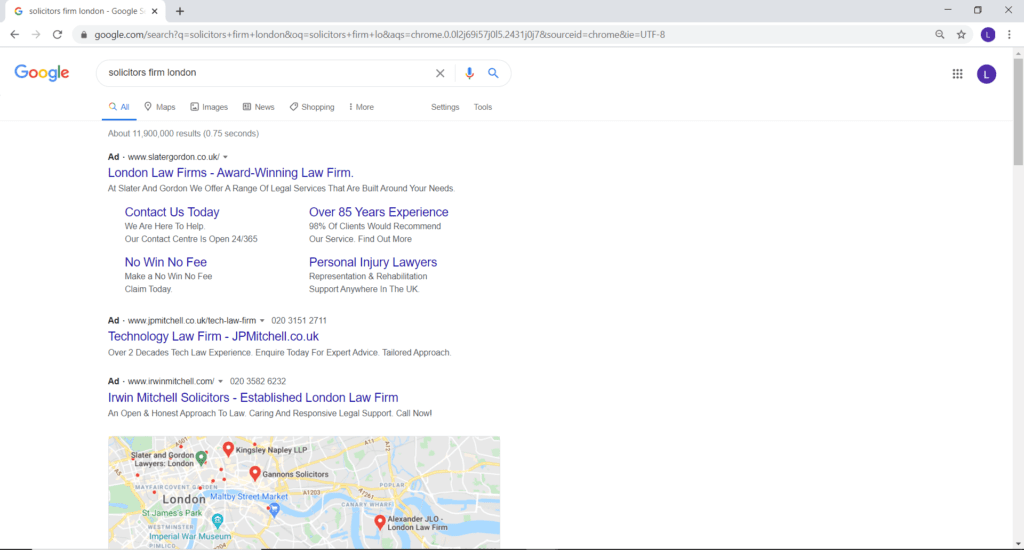
Meanwhile, some users do purposefully ignore PPC adverts depending on their search intent.
For example, companies who bid on competitor keywords have varying success.
We’ll share how to analyse which keywords are performing well on a revenue (not click-based) perspective.
Although PPC is great for generating leads, ensuring they’re high-quality leads can be difficult at the best of times.
In the legal profession, you have other issues to worry about too:
Nearly every law firm out there is bidding on Google Ads, so competition is fierce.
With large law firms being able to dominate the PPC market thanks to big advertising budgets, and small niche firms dominating the market thanks to their specialised keywords, getting cut-through can be difficult.
⚡️ Pro Tip
Get the advantage over your competitors by understanding key benchmarks for your industry. We analysed millions of datapoints in the legal sector. Download the full results of that report here.
Where there’s fierce competition, there’s expensive keywords with PPC advertising. The fact of the matter is that law firms know PPC marketing can drive quality leads. And when you know you can get a lead through a specific keyword, vying for the number one spot is going to get expensive.
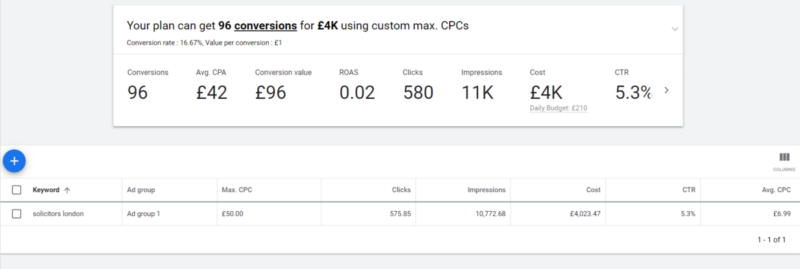
While PPC advertising can drive high-quality leads, it also drives a lot of irrelevant traffic, and leads, too. While finding relevant searchers can be tricky, you do have to weigh this up against the time your sales team is going to spend sifting through the data.
💡 Pro Tip
Notice a discrepancy between the numbers you see in Google Ads compared to Google Analytics? You’re not alone.
Download our eBook which troubleshoots why this might be happening and how you can ensure you have one single source of truth when it comes to marketing data.
PPC adverts with a direct path to sales are easy to track if your reporting is set up correctly.
However, for the legal industry, the majority of lead generation happens via form submissions, phone call or live chat. While Google Ads does allow you to track offline conversions using the GCLID, setting it up and attributing revenue back to your ad campaigns, and keywords, is tricky.
Related: Complete guide to offline conversion tracking
PPC is often a cash sink for marketers working in the legal sector.
Optimising your paid can make or break your business impact.
Related: Complete guide to legal marketing
Get it right, and it could be a solid stream of inbound leads and revenue.
Here are 9 key tips to improve PPC for legal marketing:
Measuring your PPC campaigns should always be first on your to-do list. Most legal marketers just count leads when checking the performance of their paid campaigns.
But how effective is this?
Hear us out.
A user lands on your ad, and clicks to call but immediately closes the dial pad. Another user lands on your ad, calls your sales team but is deemed low quality and so the case is not progressed.
While your sales team isn’t counting either of these as a lead, your marketing team is. In your reporting, you’re still counting two clicks-to-call, despite one not calling and one being poor quality.
So how do we combat this? Well, it’s simple.
Tools like Ruler Analytics allow you to track website visitors every time they visit. You’ll be able to get oversight of which campaigns and channels are starting their customer journeys and how they’re being moved along the funnel.
But it goes one better than that. Ruler will also link your website to your CRM, and your CRM to your marketing apps.
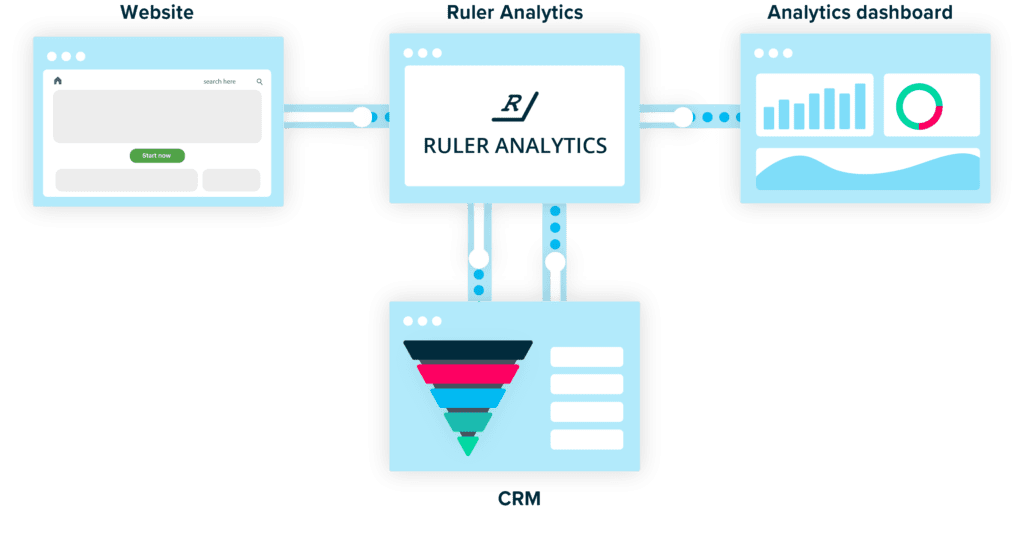
So, when you do convert a website visitor into a lead, you can track where they came from.
And then, when that lead then converts into a client, whether that’s in one month, or two years, Ruler will scrape the revenue data associated with that client and match it to your ad campaigns and marketing channels held in your analytics tool.
Whether that’s Google Analytics, Google Ads, Facebook Ads Manager or Microsoft Ads, you’ll be able to see how much revenue each campaign, and keyword, is generating.
Book a demo to find out how you can link your offline sales to your online sessions.
Forget tracking form submissions alone. With Ruler, you can see your Google Ads success on a revenue basis, and get a true understanding of your ROI.
Related: How to improve ROAS using Ruler Analytics
Not only that, but you can use the insight to optimise your ads. Now you know which campaigns, and even keywords, are resulting in the most clients (and revenue), you can make necessary changes in your Google Ads campaigns.
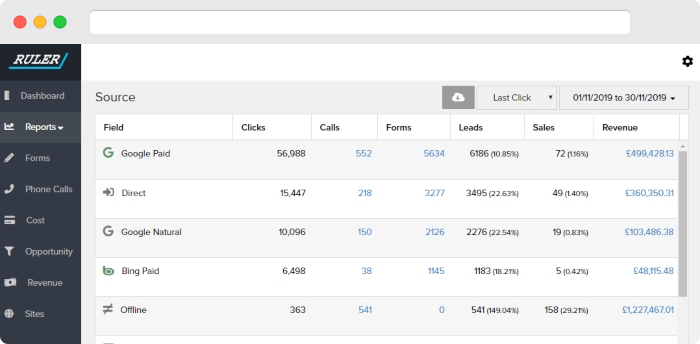
With proper lead tracking and an attribution tool in place, you can start making smarter decisions.
Related: How to calculate ROAS
Since Ruler can track offline conversions, your cost per acquisition will go down too, as you’ll be able to include those sales via call, email and store in your overall report.
Once proper tracking is put in place, you can monitor how many sales calls you get, and of those, which result in conversion.
Related: How to properly track offline conversions from PPC
This allows you to understand which online searches are resulting in the most offline conversions, and you can optimise your marketing to prioritise what’s already working.
Are you relying on manual management of your Google Ads campaigns? Google released smart bidding to help marketers get the most out of their ads.
Google’s smart bidding can create systems of bidding for you depending on your chosen objective.
Related: Guide to smart bidding
For example, if you want to get the most leads from a PPC advert, then Google will adapt its keyword choices and bidding strategy (using smart data) to help you achieve this goal.
Its machine learning will optimise your bidding, and your keywords, based on historic data. And the best part is, this optimisation can be targeted to a goal of your choice.
And, when you’re linking your Google Ads to Ruler Analytics, our solution can continuously feed Google data on what is and isn’t working both online, and offline. That means Google can keep getting smarter with what keywords it bids on and how aggressively it bids to get prime place.
Calls are generally the bread and butter of lead generation for legal firms. While your phone number should be pride and place on your website, how are you tracking calls made?
Many law firms rely on their call centre team to make notes on callers post-call. But how reliable is this?
Related: How to track cost per lead
Tracking offline conversions is a must for understanding your true cost per lead, and cost per acquisition. With phone calls such a huge part of your inbound lead generation strategy, tracking calls is essential to understanding your clients.
Of course, your call centre team could ask inbound enquiries where they found you. There are two problems with this, though. The first, it’s quite jarring to ask this question in the middle of a sales call. Two, it’s unreliable!
Related: Why asking ‘how did you hear about us?’ isn’t enough
Call tracking with Ruler Analytics means you can monitor all of your inbound calls. And, you can pinpoint the channels, campaigns and keywords that are working hardest to bring inbound calls.
Once you’ve identified what’s working, you can optimise it and watch the numbers increase.
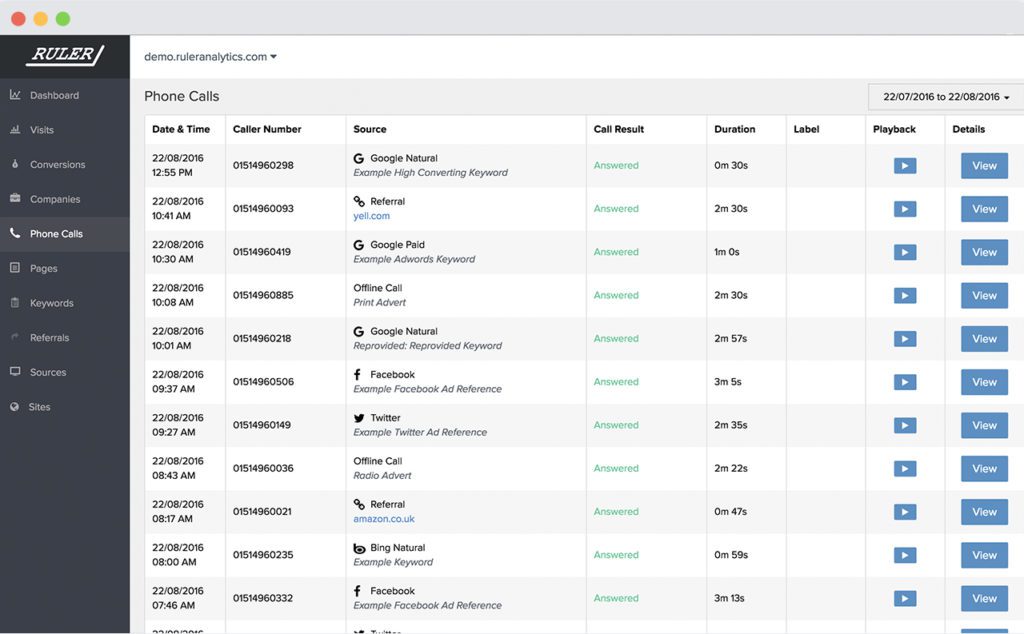
👉 Book a demo to see how you can track calls and other key conversions
From a purely sales perspective, you should be recording your inbound calls.
Not only is this great for training purposes, it also means you can get an overview of lead quality as a marketing team. If your sales team starts to notice a large number of low-quality calls, you can use Ruler to track and trace those calls and identify where they’re coming from.
You might find that they’re all generating from a specific keyword on your ad campaign. This insight means you can really drill down into understanding your high-quality leads and where to find them.
Often, potential clients want to speak to a case handler straight away. Ensure you use call extensions on your PPC adverts to get them straight from the Google search page.
We can’t encourage that enough! And don’t worry, we’ll still be able to track calls using static numbers labelled against a particular campaign.
Ok, so not every potential client wants to chat on the phone. The younger demographic tends to prefer live chat to phone calls, so make sure you install a live chat function onto your website.
You’ll need to ensure someone is manning it during office hours, as users will want a quick response.
You can also integrate your live chat system with functions that allow you to schedule calls with the client, or request a call back.
✉️ Pro Tip
Live chat conversations and conversions can be tricky to track and link. But not when you have a marketing attribution tool in play.
Read the full guide to tracking live chat conversions and conversations.
PPC ads aren’t about volume. While number of impressions is a necessary metric to track when monitoring your pay-per-click adverts, what we should care about is impact on the bottom line.
And no, we’re not talking about clicks either.
Pre-qualifiying your legal PPC adverts means that, while less people may click on it, those who do will be more closely aligned to your target audience.
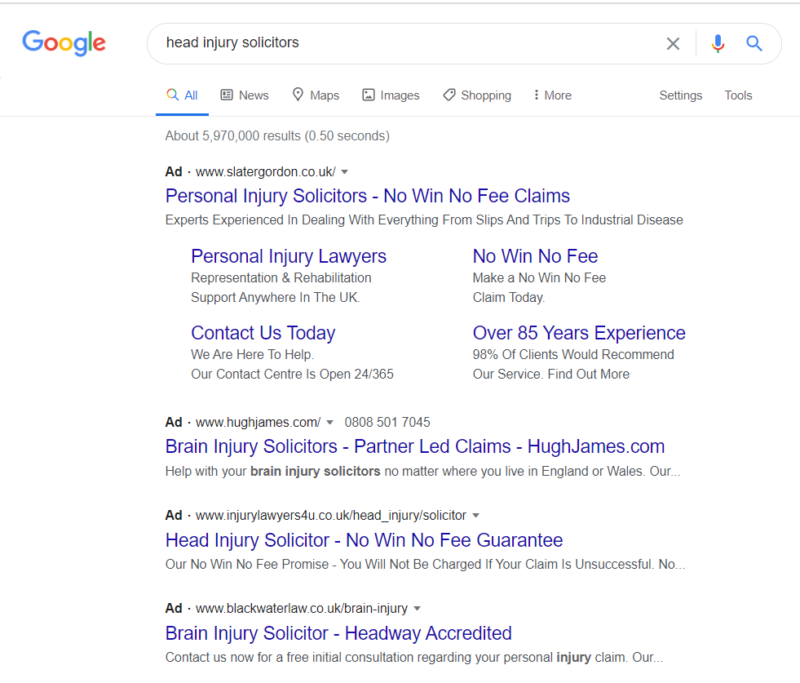
Bing who, right? Well, actually there’s plenty of use cases saying Microsoft Ads could be a great tool for legal marketers. Many already using its advertising are seeing a much higher conversion rate which is costing less money.
Of course remember, the volume of searches is not going to be anywhere near as high as Google.
So, if you’re more niche, then Microsoft Ads may not be for you. However, if you’re finding it hard to cut-through on more expensive keywords, then it could be a valid alternative to explore.
And remember, if you’re using multi-touch attribution, well, you can test which works best for you.
And there it is. Nine tips on how to improve your law firm’s PPC campaigns.
Hopefully, these help your company to stand out from the crowd.
Get started by implementing proper tracking and measurement by booking a demo of Ruler Analytics. Or, find out more about how Ruler can help your legal marketing team with attribution.
Our solution can help you improve your return on ad spend and optimise your campaigns to continue generating high-quality leads.
